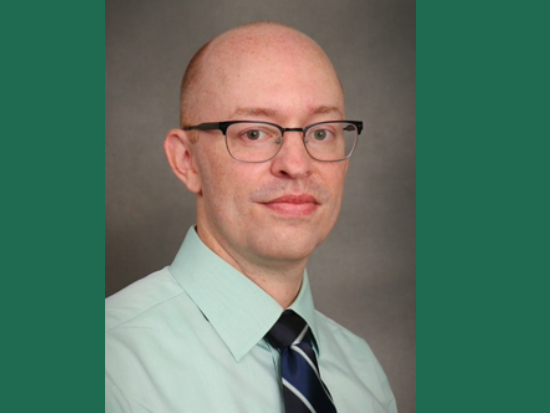 S. Justin Thomas, Ph.D., FSBSM, associate professor in the Department of Psychiatry and Behavioral Neurobiology, will soon begin his tenure as president of the Society of Behavioral Sleep Medicine (SBSM), effective November 1, 2024.
S. Justin Thomas, Ph.D., FSBSM, associate professor in the Department of Psychiatry and Behavioral Neurobiology, will soon begin his tenure as president of the Society of Behavioral Sleep Medicine (SBSM), effective November 1, 2024.
Thomas earned his doctorate degree in clinical health psychology from the University of Alabama, specializing in health psychology and behavioral sleep medicine.
He completed his clinical internship at the University of Florida, followed by clinical fellowships in behavioral sleep medicine at the University of Alabama and the University of Florida. Additionally, he undertook a two-year post-doctoral research fellowship on sleep and hypertension at UAB.
“My involvement with the Society of Behavioral Sleep Medicine started as a student member during my graduate studies,” Thomas said. “Over the years, I've taken on several leadership roles, including co-chair of the annual Scientific Conference in 2019, chair of the Clinical Practice Committee, and a member of the Board of Directors for the past three years. To continue shaping the organization's future, I decided that serving as president would be the most effective way to contribute.”
Thomas shares his inspiration and vision as president of SBSM, emphasizing his desire to guide its future development.
What specific goals do you hope to achieve as president?
Thomas: At our most recent annual meeting in Chicago, I outlined three specific goals that I believe are crucial for advancing the field of behavioral sleep medicine (BSM) and the SBSM as an organization. These goals are: 1) expanding awareness of BSM beyond just insomnia treatment to include conditions like circadian rhythm sleep-wake disorders and nightmare disorder; 2) collaborating with partner organizations such as the United States Association for the Study of Pain; and 3) fostering the growth, engagement, and retention of our student and international members.
How do you envision the SBSM evolving under your leadership?
Thomas: My clinical and research interests focus on circadian rhythm sleep-wake disorders and their associated health outcomes, as well as disparities in sleep and circadian rhythms. Historically, BSM has been synonymous with insomnia treatments. However, I would like to see greater recognition of the benefits of BSM for all sleep disorders, not just insomnia. Additionally, I aim to increase global awareness of and participation in the SBSM.
How do you plan to leverage your expertise in psychiatry to benefit the SBSM?
Thomas: The UAB Department of Psychiatry and Behavioral Neurobiology has been incredibly supportive of my work in BSM. Given my experiences as a clinician scientist in my department, I can represent a broad SBSM membership that includes clinicians and scientists in various settings, including private practice, industry, the Veteran’s Health Administration, and academic research institutions. I think the key to serving any organization is to be able to represent such a multifaceted membership, and my experiences within the UAB Department of Psychiatry and Neurobiology position me extremely well to do so.
What are some of the biggest challenges you foresee in this role, and how do you plan to address them?
Thomas: BSM is highly effective for a range of sleep disorders and also offers significant benefits for various co-morbid mental and physical health conditions. The primary challenge I face is advocating for the value of BSM services to ensure universal access. A close second is engaging our students and international members and finding the best ways to support their career development.
What initiatives or projects are you most excited to start or continue as president?
Thomas: The previous president, Dr. Michael Nadorff, recently won an Emmy for a video on treating nightmare disorder in children using BSM approaches. He and other previous presidents have emphasized the importance of recognizing all aspects of BSM. I am dedicated to continuing this mission. As chair of the Circadian Rhythm Sleep-Wake Disorders (CRSWDs) writing group, I will lead the development of clinical guidelines for the behavioral treatment of CRSWDs. I am very excited to advance the field of circadian medicine through the SBSM and its partner organizations.
How do you see the field of behavioral sleep medicine changing in the next few years, and what role do you hope the Society will play in those changes?
Thomas: I firmly believe that the field of BSM will become increasingly important in the coming years. As lifestyle factors and behaviors are increasingly recognized as key contributors to health and disease, I hope BSM becomes more widely accessible.